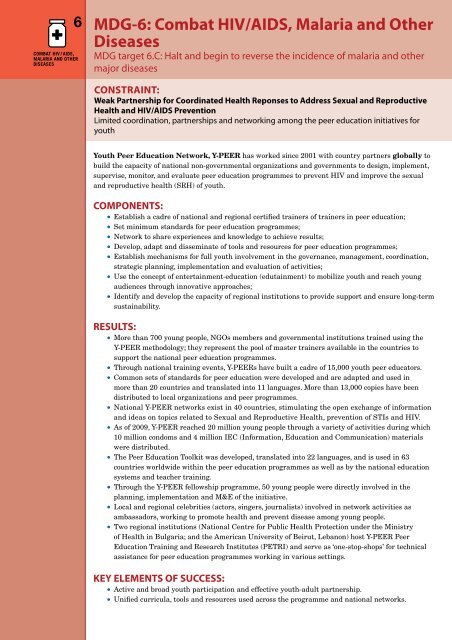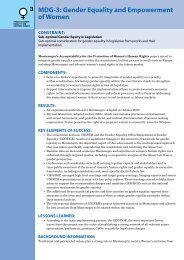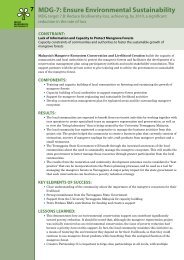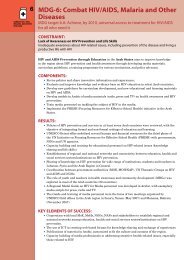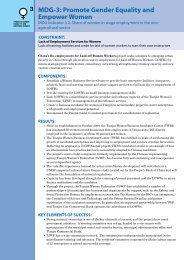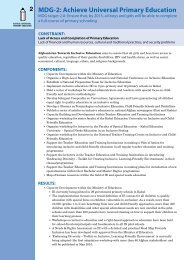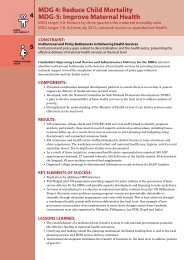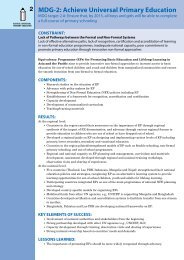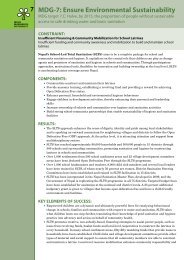MDG-6: Combat HiV/aiDs, Malaria and other ... - mdgnet.undg.org
MDG-6: Combat HiV/aiDs, Malaria and other ... - mdgnet.undg.org
MDG-6: Combat HiV/aiDs, Malaria and other ... - mdgnet.undg.org
Create successful ePaper yourself
Turn your PDF publications into a flip-book with our unique Google optimized e-Paper software.
<strong>MDG</strong>-6: <strong>Combat</strong> HIV/AIDS, <strong>Malaria</strong> <strong>and</strong> OtherDiseases<strong>MDG</strong> target 6.C: Halt <strong>and</strong> begin to reverse the incidence of malaria <strong>and</strong> <strong>other</strong>major diseasesConstraint:Weak Partnership for Coordinated Health Reponses to Address Sexual <strong>and</strong> ReproductiveHealth <strong>and</strong> HIV/AIDS PreventionLimited coordination, partnerships <strong>and</strong> networking among the peer education initiatives foryouthYouth Peer Education Network, Y-PEER has worked since 2001 with country partners globally tobuild the capacity of national non-governmental <strong>org</strong>anizations <strong>and</strong> governments to design, implement,supervise, monitor, <strong>and</strong> evaluate peer education programmes to prevent HIV <strong>and</strong> improve the sexual<strong>and</strong> reproductive health (SRH) of youth.Components:• Establish a cadre of national <strong>and</strong> regional certified trainers of trainers in peer education;• Set minimum st<strong>and</strong>ards for peer education programmes;• Network to share experiences <strong>and</strong> knowledge to achieve results;• Develop, adapt <strong>and</strong> disseminate of tools <strong>and</strong> resources for peer education programmes;• Establish mechanisms for full youth involvement in the governance, management, coordination,strategic planning, implementation <strong>and</strong> evaluation of activities;• Use the concept of entertainment-education (edutainment) to mobilize youth <strong>and</strong> reach youngaudiences through innovative approaches;• Identify <strong>and</strong> develop the capacity of regional institutions to provide support <strong>and</strong> ensure long-termsustainability.Results:• More than 700 young people, NGOs members <strong>and</strong> governmental institutions trained using theY-PEER methodology; they represent the pool of master trainers available in the countries tosupport the national peer education programmes.• Through national training events, Y-PEERs have built a cadre of 15,000 youth peer educators.• Common sets of st<strong>and</strong>ards for peer education were developed <strong>and</strong> are adapted <strong>and</strong> used inmore than 20 countries <strong>and</strong> translated into 11 languages. More than 13,000 copies have beendistributed to local <strong>org</strong>anizations <strong>and</strong> peer programmes.• National Y-PEER networks exist in 40 countries, stimulating the open exchange of information<strong>and</strong> ideas on topics related to Sexual <strong>and</strong> Reproductive Health, prevention of STIs <strong>and</strong> HIV.• As of 2009, Y-PEER reached 20 million young people through a variety of activities during which10 million condoms <strong>and</strong> 4 million IEC (Information, Education <strong>and</strong> Communication) materialswere distributed.• The Peer Education Toolkit was developed, translated into 22 languages, <strong>and</strong> is used in 63countries worldwide within the peer education programmes as well as by the national educationsystems <strong>and</strong> teacher training.• Through the Y-PEER fellowship programme, 50 young people were directly involved in theplanning, implementation <strong>and</strong> M&E of the initiative.• Local <strong>and</strong> regional celebrities (actors, singers, journalists) involved in network activities asambassadors, working to promote health <strong>and</strong> prevent disease among young people.• Two regional institutions (National Centre for Public Health Protection under the Ministryof Health in Bulgaria; <strong>and</strong> the American University of Beirut, Lebanon) host Y-PEER PeerEducation Training <strong>and</strong> Research Institutes (PETRI) <strong>and</strong> serve as ‘one-stop-shops’ for technicalassistance for peer education programmes working in various settings.Key Elements of Success:• Active <strong>and</strong> broad youth participation <strong>and</strong> effective youth-adult partnership.• Unified curricula, tools <strong>and</strong> resources used across the programme <strong>and</strong> national networks.
• Collaboration <strong>and</strong> partnerships with individual experts, <strong>org</strong>anizations, private sector, popularindividuals, <strong>other</strong> existing networks, <strong>and</strong> parliamentarians.• Feeling of ownership by youth network members.• Partnership with regional institutions to assume a major role as supporters in the process ofensuring sustainability of the network.• Establishment of credible <strong>and</strong> innovative partnerships with institutions <strong>and</strong> agencies that sharea commitment to empowering young people by providing platforms to articulate their needs <strong>and</strong>ambitions, facilitates motivation among network members.Lessons Learned:• Youth fellows greatly contribute to the progress of national Y-PEER networks, especially withrespect to governance <strong>and</strong> coordination• Reinforcing the training methodology <strong>and</strong> a system of graduation <strong>and</strong> advancement within theprogramme are good mechanisms to counter the high attrition rate among trainees.• Innovative approaches closely linked with the youth culture <strong>and</strong> trends should be used formobilizing <strong>and</strong> reaching young people, especially young boys.• A regionally based support entity is an effective mechanism to provide support to the network.• Effective, transparent <strong>and</strong> accountable governance is important sustainability factor of anynetwork.• The process of adoption <strong>and</strong> implementation of st<strong>and</strong>ards in peer education is complex <strong>and</strong>lengthy <strong>and</strong> requires broad stakeholder involvement.• Monitoring <strong>and</strong> evaluation of the skills of youth network members must be part of strategiccapacity development plans.• Adaptation <strong>and</strong> translation of tools <strong>and</strong> training into national languages ensures broaderrepresentation of youth from the local communities.Background Information:Y-PEER, the Youth Peer Education Network, is a groundbreaking <strong>and</strong> comprehensive youth-to-youthinitiative pioneered by UNFPA. Y-PEER is a network of more than 700 NGOs <strong>and</strong> governmentalinstitutions; its membership includes 7,000 youth from 40 countries in Eastern Europe, Central Asia,the Middle East, North <strong>and</strong> East Africa <strong>and</strong> was recently initiated in Asia <strong>and</strong> Pacific <strong>and</strong> LatinAmerica.With the youth-adult partnership <strong>and</strong> strategic communication for behaviour change <strong>and</strong> developmentat its core, Y-PEER sets st<strong>and</strong>ards, develops <strong>and</strong> disseminates training techniques <strong>and</strong> tools, connectspeople within <strong>and</strong> between countries, <strong>and</strong> mobilizes youth by using innovative partnerships <strong>and</strong>modern media to involve <strong>and</strong> motivate them in their communities.Y-PEER is based on person-to-person meetings <strong>and</strong> connects its members through electroniccommunication tools. It provides training events, campaigns, workshops, <strong>and</strong> video conferences <strong>and</strong>produces tools related to peer education, youth-adult partnerships, ‘edutainment’, <strong>and</strong> youth advocacy.Implementation Partners:UNFPA (Regional, Sub-regional, <strong>and</strong> Country Offices); Y-PEER members; more than 600 localNGOs, UNAIDS; UNICEF; MTV; National Centre for Public Health Protection, Bulgaria; AmericanUniversity of Beirut; Dance4Life; SOA AIDS Netherl<strong>and</strong>s; NiteStar Theater Programme; Family HealthInternational.Contacts:Marija Vasileva-BlazevUNFPA Regional Office, Eastern Europe <strong>and</strong> Central Asia220E 42nd Street, New York, NY 10017Phone: +1212-297-2703Email: vasileva-blazev@unfpa.<strong>org</strong>


